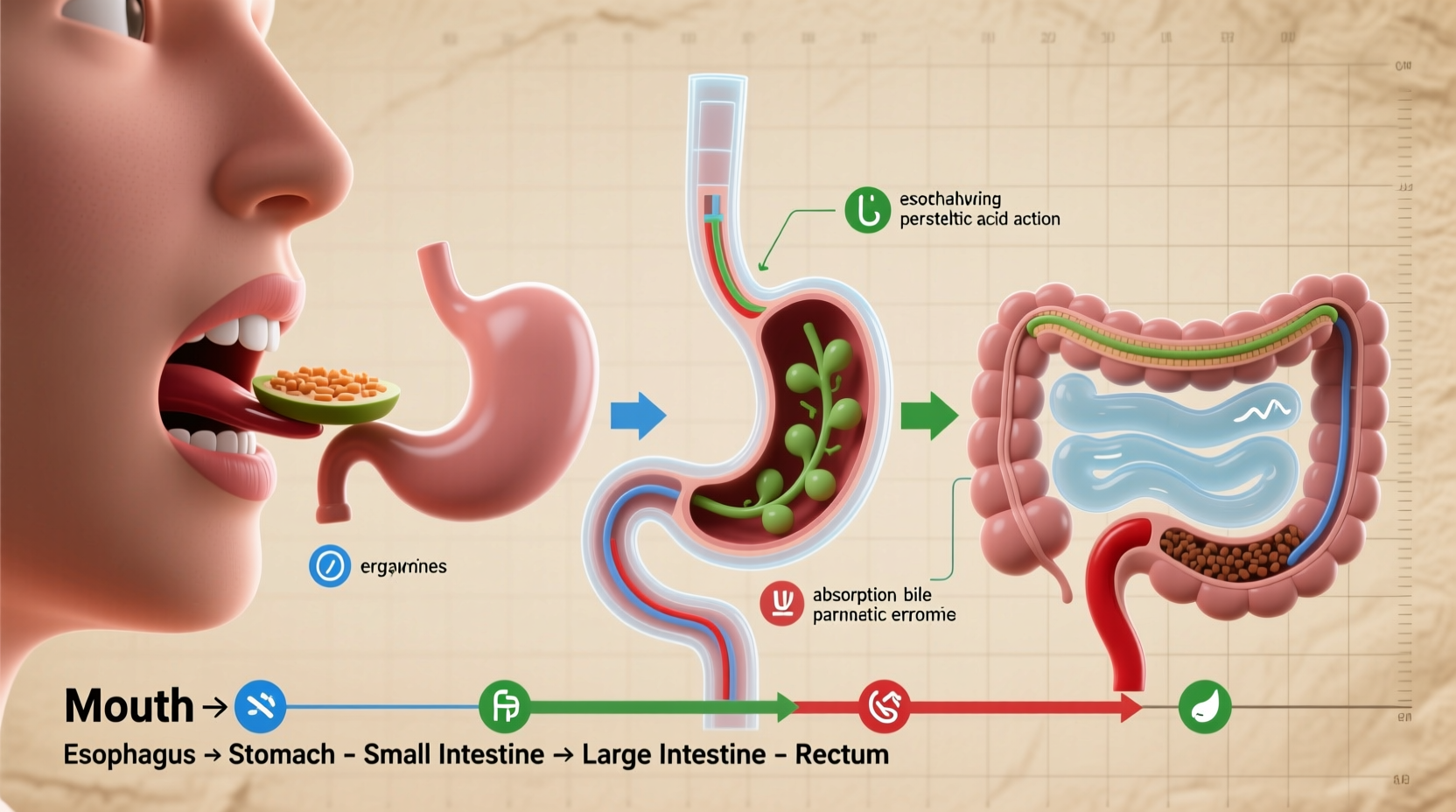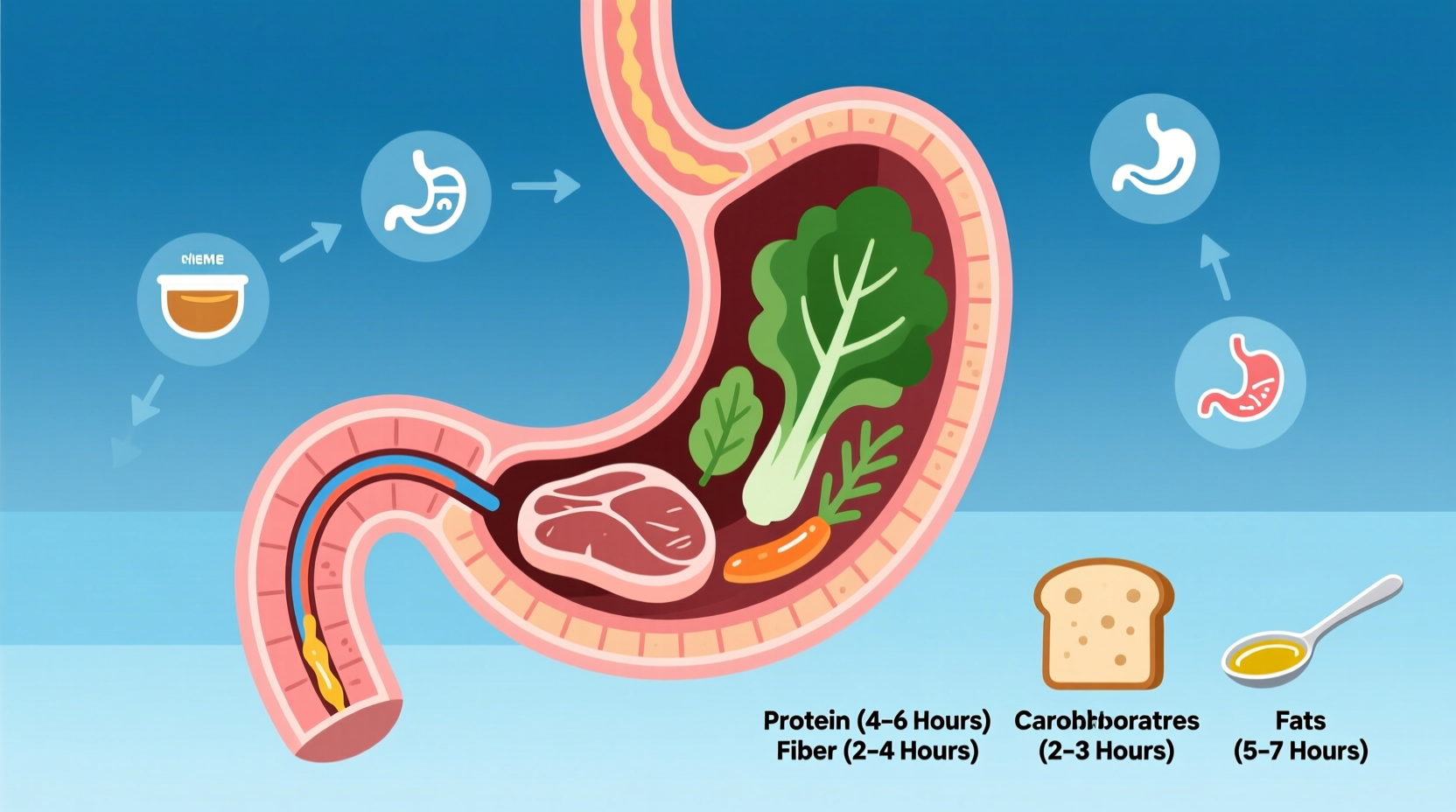Ever wonder why you feel full for hours after a steak dinner but hungry again shortly after a fruit smoothie? Understanding how long food stays in the stomach reveals crucial insights about your digestive health and energy management. This knowledge helps optimize meal timing, manage digestive discomfort, and make informed dietary choices that align with your body's natural rhythms.
What Determines Stomach Emptying Time?
Your stomach isn't just a passive storage container—it actively processes food through muscular contractions while mixing it with digestive enzymes. The duration food remains in your stomach depends on several key factors that interact in complex ways.
Food Composition: The Primary Driver
Different macronutrients trigger distinct digestive responses. Carbohydrates generally exit fastest, followed by proteins, with fats significantly slowing the process. This explains why a bagel vanishes from your stomach quicker than a cheeseburger.
| Food Type | Typical Stomach Emptying Time | Digestive Impact |
|---|---|---|
| Water and clear liquids | 10-20 minutes | Pass through rapidly to small intestine |
| Simple carbohydrates (fruit, juice) | 30-60 minutes | Quick energy source, minimal stomach processing |
| Proteins (chicken, fish, eggs) | 2-3 hours | Moderate emptying rate, requires significant enzymatic breakdown |
| Fats and oils | 3-4+ hours | Significantly delays gastric emptying, triggers hormone release |
| High-fiber foods (vegetables, whole grains) | 2-3 hours | Fiber slows emptying but promotes healthy digestion |
This comparison comes from research published by the National Institute of Diabetes and Digestive and Kidney Diseases, which confirms that fat content creates the most significant delay in gastric emptying through hormonal signaling.
Meal Size and Caloric Density
Larger meals naturally take longer to process. A 500-calorie salad exits faster than a 1,200-calorie steak dinner. The stomach adjusts its emptying rate based on caloric load—higher calorie density means slower processing. This explains why you feel satisfied longer after substantial meals, but also why oversized portions can cause discomfort as your stomach works overtime.
Individual Health Factors
Your personal physiology dramatically affects digestion timing. Conditions like diabetes can cause gastroparesis (delayed stomach emptying), while anxiety triggers adrenaline that speeds up the process. Age matters too—stomach emptying slows by approximately 15% between ages 20 and 70 according to Mayo Clinic research. Even your menstrual cycle influences digestion, with slower emptying during certain phases.

The Digestive Timeline: What Happens Hour by Hour
Understanding the stomach's processing sequence helps explain why certain foods affect fullness duration:
- 0-15 minutes: Liquids begin moving to small intestine; stomach starts churning solids
- 30-60 minutes: Carbohydrate-rich foods begin emptying; blood sugar starts rising
- 1-2 hours: Protein digestion intensifies; stomach releases peptides triggering satiety hormones
- 2-3 hours: Fat digestion dominates; stomach releases cholecystokinin slowing emptying rate
- 3-4+ hours: Final processing of high-fat meals; stomach signals readiness for next meal
This progression, documented in Johns Hopkins Medicine studies, shows why balanced meals provide sustained energy while high-sugar foods cause quick spikes and crashes.
When Digestion Timing Becomes Problematic
While normal stomach emptying ranges from 2-5 hours, certain symptoms indicate potential issues:
- Excessively slow emptying (beyond 6 hours): Could signal gastroparesis, often associated with diabetes or neurological conditions
- Rapid emptying (under 1.5 hours): May cause dumping syndrome with symptoms like dizziness and sweating
- Inconsistent timing: Significant variation between similar meals could indicate digestive disorders
Context matters significantly—what's normal for one person might indicate problems for another. Athletes often experience faster gastric emptying during exercise, while stress can either speed up or slow down digestion depending on individual response patterns.
Practical Strategies for Healthy Digestion Timing
You can optimize your stomach emptying process with these evidence-based approaches:
Meal Composition Adjustments
Balance macronutrients strategically based on your needs. Need sustained energy for afternoon work? Combine lean protein with complex carbs and healthy fats. Want quick energy before a workout? Focus on easily digestible carbohydrates with minimal fat. The American Gastroenterological Association recommends including moderate fat (20-30g per meal) to maintain steady energy without excessive fullness.
Portion Control Techniques
Divide large meals into smaller portions spaced 20-30 minutes apart. This approach, called "fractional meals," prevents overwhelming your stomach while maintaining energy levels. Research shows this method reduces post-meal bloating by up to 40% compared to single large meals.
Digestive-Supporting Habits
- Chew thoroughly: Proper mastication reduces stomach workload by 30%
- Stay hydrated: Sip water during meals (not large amounts) to support enzymatic activity
- Manage stress: Practice deep breathing before meals to optimize parasympathetic nervous system function
- Consider timing: Allow 3-4 hours between substantial meals for complete stomach emptying
Special Considerations for Common Dietary Patterns
Different eating approaches affect stomach emptying uniquely:
- Intermittent fasting: Stomach emptying normalizes during eating windows but may initially feel faster due to heightened sensitivity
- Plant-based diets: Higher fiber content typically extends stomach emptying by 20-30 minutes but promotes healthier overall digestion
- High-protein diets: Can increase stomach emptying time by 1-2 hours, requiring careful hydration to prevent discomfort
These variations explain why dietary transitions often cause temporary digestive adjustments as your body adapts to new emptying patterns.
When to Consult a Healthcare Professional
While normal stomach emptying varies, seek medical advice if you experience:
- Persistent nausea or vomiting after meals
- Unexplained early fullness during meals
- Consistent bloating lasting more than 3 hours post-meal
- Unintended weight loss alongside digestion changes
These symptoms could indicate underlying conditions requiring professional evaluation. Diagnostic tests like gastric emptying studies can precisely measure your stomach's processing time.
Optimizing Your Digestive Experience
Understanding how long food stays in the stomach empowers you to make smarter dietary choices. By aligning meal composition with your daily schedule and energy needs, you can prevent uncomfortable fullness, maintain steady energy, and support overall digestive health. Remember that optimal digestion isn't about speed—it's about harmony between your eating patterns and your body's natural rhythms.











 浙公网安备
33010002000092号
浙公网安备
33010002000092号 浙B2-20120091-4
浙B2-20120091-4